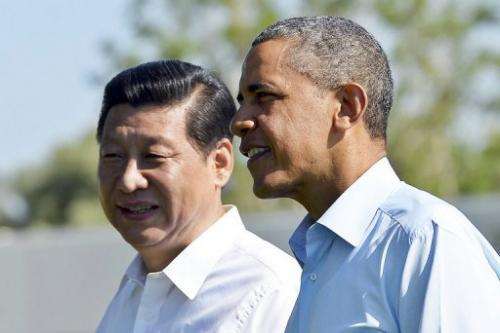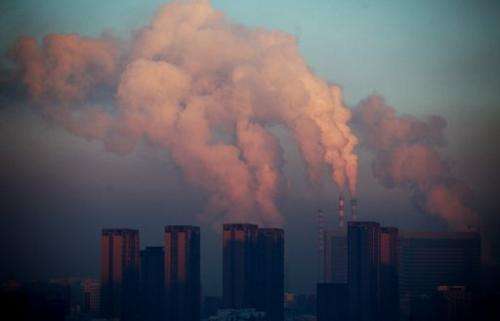US, China agree to end 'super greenhouse gases'

China agreed Saturday with the United States to scale back production of "super greenhouse gases" used in refrigerators and air conditioners in a joint bid to fight climate change.
The two nations made the pledge after a closely watched first summit between Presidents Barack Obama and Xi Jinping, who lead the world's top two emitters of greenhouse gases blamed for the planet's increasingly volatile climate.
In a statement, China and the United States "agreed to work together" through an international body to "phase down the production and consumption" of hydrofluorocarbons (HFCs), dubbed super greenhouse gases for their pollution.
The White House said that a global phasedown of HFCs could reduce carbon emissions by 90 gigatons by 2050—equivalent to around two full years worth of the world's greenhouse gas emissions.
China—by far the largest producer of HFCs—had until recently resisted efforts by the United States and other wealthy nations to scale back the super greenhouse gases, arguing that alternatives in appliances were not fully ready.
But China agreed in April to end HFC production by 2030 as part of a $385 million assistance package by wealthy countries under the Montreal Protocol, which was set up to fight the depletion of the ozone layer.

China and other developing nations such as India had initially argued that the Montreal Protocol was not the best instrument to target HFCs and that the issue should instead by handled under the Kyoto Protocol on climate change.
Some critics accused China of holding off on ending HFC production as it wanted to keep the flow of money from European Union nations that can earn credits for carbon emissions by cleaning up dirty production overseas.
The US-China statement made clear that HFCs would remain within the scope of the Kyoto Protocol and the related UN Framework Convention on Climate Change "for accounting and reporting of emissions."
The statement said that China and the United States would work together at the Montreal Protocol.
The United States, Canada and Mexico—along with Micronesia, which greatly fears rising sea levels from climate change—have proposed a global end to HFCs through the Montreal Protocol.
The United States and China—which together account for more than 40 percent of greenhouse gas emissions—have both faced international criticism for not doing more on climate change.
China has embraced solar and other green technologies, but has resisted binding commitments in talks on a successor to the Kyoto Protocol, arguing that such requirements were unfair considering its stage of development.
But China has witnessed a growing debate on requiring curbs on emissions—not just a commitment to scale back the intensify of its own emissions, as per current policy—as concern rises over the country's pollution woes.
Obama took office in 2009 vowing to do more on climate change after the skepticism of his predecessor George W. Bush.
But efforts backed by Obama to require caps on carbon emissions died in the US Congress, where many lawmakers from the rival Republican Party question the cost of such action and question the science behind climate change.
The planet has charted a slew of record hot years and some scientists link recent catastrophes—such as superstorm Sandy in the United States, droughts in Russia and massive floods in Pakistan—to climate change.
© 2013 AFP



















